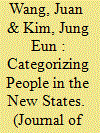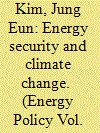|
|
|
Sort Order |
|
|
|
Items / Page
|
|
|
|
|
|
|
| Srl | Item |
| 1 |
ID:
191963


|
|
|
|
|
| Summary/Abstract |
What motivates states’ choice of social classification? Existing explanations highlight scientific beliefs of modern states or social engineering by ideological regimes. Focusing on the initial state-building period of two Communist regimes, China and North Korea, this article complements the existing literature and suggests that social classification reflects three missions of political leaders: regime distinction, governance, and power consolidation. Population categories are created to distinguish the new government from the old, to selectively provide welfare, and to attack political opponents. The varying weight of the missions and their manifestation in social classification depend on new ruling elites’ cohesion and past experiences. This comparative historical analysis sheds light on the rise of political chaos in China and the personalistic dictatorship in North Korea in the 1970s.
|
|
|
|
|
|
|
|
|
|
|
|
|
|
|
|
| 2 |
ID:
119794


|
|
|
|
|
| Publication |
2013.
|
| Summary/Abstract |
The Clean Development Mechanism (CDM) provides an institutional framework for developed countries to support projects that reduce greenhouse gas emissions in developing countries. Are the technologies promoted those most needed by the recipient countries? We address this question by first reviewing Technology Needs Assessments prepared by developing countries, and then comparing the stated needs to the technologies most frequently promoted via CDM. While there appears to be a good match between requested technologies and those used in CDM, desired technologies such as solar energy for remote locations, biofuels, improved cooking stoves, and efficient lighting appear "neglected" by CDM. Nonetheless, a review of costs for these technologies suggests that many could be cost effective for developing countries. For projects requiring wide dispersal of household items, such as cooking stoves or lighting, the administrative burdens of CDM provide a hurdle. In other cases, difficulties quantifying the ancillary benefits of these projects hinder the promotion of these technologies. We conclude with possible explanations for why these technologies are neglected and suggestions for future research.
|
|
|
|
|
|
|
|
|
|
|
|
|
|
|
|
| 3 |
ID:
127996


|
|
|
|
|
| Publication |
2014.
|
| Summary/Abstract |
Fast growing global energy needs raise concerns on energy supply security and climate change. Although policies addressing the two issues sometimes benefit one at the expense of the other, technology innovation, especially in alternative energy, provides a win-win solution to tackle both issues. This paper examines the effect of oil endowment on the patterns of technology innovation in the transportation sector, attempting to identify drivers of technology innovation in alternative energy. The analysis employs panel data constructed from patent data on five different types of automobile-related technologies from 1990 to 2002: oil extraction, petroleum refining, fuel cells, electric and hybrid vehicles (EHV) and vehicle energy efficiency. I find that countries with larger oil endowments perform less innovation on refining and alternative technologies. Conversely, higher gasoline prices positively impact the patent counts of alternative technologies and energy efficiency technology. The findings highlight the challenges and importance of policy designs in international climate change agreements.
|
|
|
|
|
|
|
|
|
|
|
|
|
|
|
|
|
|
|
|
|